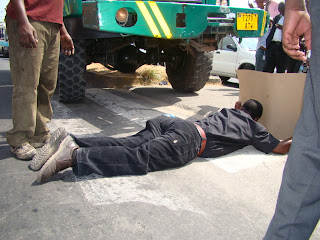I spent last night craning my
neck to get a glimpse of a documentary being projected onto a worn piece of
cloth. The small auditorium was packed
and I couldn’t resist responding ‘when the fire starts’ to the person ahead of
me who asked when they would stop letting people in. Thankfully, the only fires that started last
night were those of hopeful aspiration, kindled by the passion of the subject
of the film.
We were all gathered to watch one
of our own: a woman who adopted Tanzania, and later the world as her home –
Jane Goodall.
Jane’s Journey traces the life story of Jane Goodall
and how she transformed from a famous field biologist to an infamous
conservationist, with a mission to take her message around the globe. If you can imagine, at 77 she travels 300
days a year to relay the urgency of protecting the natural world and inspire
hope that the youth of the world can and will meet the challenge. I recommend you find and watch this film.
After the documentary, Ms.
Goodall took the stage and for a moment the small room was filled with snapping
shutters and flashes of light as everyone raced to capture the moment. Some impassioned remarks, fervent applause
and a few more pictures later, the floor opened to questions.
There were a number of young
students from the international school in the audience. Immediately the room filled with the laughter
and self-assured voices of twelve year olds who were not going to miss their
opportunity to talk to Jane. Among my
favourite questions: ‘do chimps like vegetables?’
The concrete floor was hard (the
perils of running late) and as I shifted I caught a glimpse of the feet of the
eight year old perched in front of me.
They were black. I stole a
glimpse at the soles of my own – grey.
Those of the man next to me? Slightly less so. All of us had dirty feet.
A digression from paying
attention to one of the most famous scientists of our time? Maybe. But since then I’ve been trying to work out
what was so striking about this to me.
There’s a saying about not being afraid to get your hands dirty. But you
can get your hands dirty making a cake or with ink from your pen. In contrast, when your feet are dirty, it’s
almost guaranteed to be because you have made contact with the earth. Our feet root us to the world and when they
are dirty, they scream ‘I’ve been there!’ It’s a beautiful thing. As Theoreau said: “Think of our life in
nature, — daily to be shown matter, to come in contact with it, — rocks, trees,
wind on our cheeks! The solid earth! the actual world! ...Contact!
Contact!’ Sure, the blackened soles of Dar es Salaam
aren’t likely to be from a day of hiking in the wild but they are a daily
testimony that nature is inescapable.
In my opinion, this is the essence of what Jane is trying to
preserve for the next generation: a chance for contact with the natural world –
in our own back yards as much as in the opportunity to explore the pristine
jungles and star filled skies of her youth.
The truth - that you don’t have to live in a jungle (urban or otherwise)
to make efforts to be at peace in the world and work to sustain it – is
inspiring.
